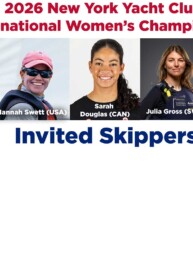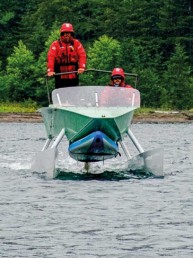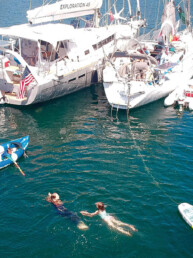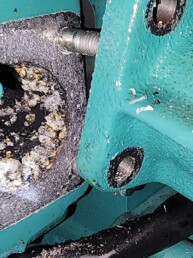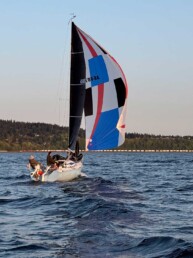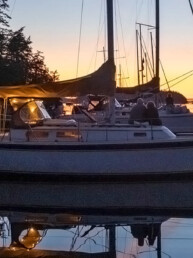From the March, 2021 issue of 48° North.
In 20/20 hindsight (or is that 2020?), one bright spot in the local sailing scene last year was the explosive growth of interest in shorthanded racing. To keep races going during the Covid-19 pandemic, race committees were limiting crew sizes and added new shorthanded divisions. The announcement of the new Mixed Two Person Offshore Keelboat event being added to the 2024 Olympics further contributed to the interest and enthusiasm. Embracing the new norm, both the Southern Sound Series and the North Sound Party Circuit (among others) will now feature shorthanded divisions for all 2021 series events.
We are new to shorthanded racing—and to each other. We have both sailed for more than 25 years and raced for more than five years. Stephanie campaigned her crewed J/33 Dash to 48° North’s Top 25 Sailboats in 2019. Ken has raced his crewed Martin 242 throughout the North Sound and British Columbia in more than 350 starts over the past five years. Being based on Orcas Island in the San Juans and in Bellingham — well away from population centers — we have each found it challenging to find consistent crew with the flexibility to travel to events.
When we started dating in late 2019, we discovered that we both wanted to compete in more challenging distance races, but without the complexity of managing crews. Sailing doublehanded was a solution that could give us new challenges and solve the crew dilemma. We could simply rely on each other and go race against like-minded shorthanded crews.
What boat would become our platform? We felt that Stephanie’s J/33 — with its overlapping headsail, symmetric kite, and lines not easily controlled from the helm — would not be ideal for doublehanded racing. While certainly doable, we decided to hunt for a new boat that we could learn together and that we wouldn’t easily outgrow. We liked the 30-ish size — small enough to easily manage with a crew of two and large enough to safely take ocean racing. We seriously considered a Quest 30, Figaro, Jeanneau Sun Fast 3300, and several J/boats including a J/105, J/109, J/88, J/99, and J/111. Each had its pros and cons.
The more we considered how we’d like to use the boat and talked with others who were already racing shorthanded, we kept coming back to the new J/99. We liked that it was specifically designed for doublehanding and that it was one of a dozen platforms in contention for the 2024 Olympics. After less than a year on the market, more than 40 had already been sold and we felt it would be a growing platform for several years to come. Sailing a boat like this locally could also open up opportunities for us to compete in other parts of the country someday. At the Seattle Boat Show in January 2020 after dating only four months, we took the plunge and ordered a new J/99, hull number 49. And then, instantly, the world changed. Our spring delivery date slid to summer as the factory closed due to Covid and then shipping damage to the mast delayed delivery to us until October. But the new boat eventually joined us here in the Pacific Northwest.
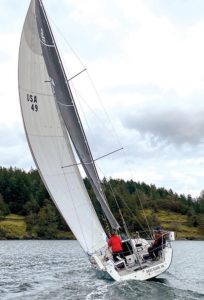
We kept the name, Dash, from Stephanie’s J/33. The name obviously has race-related meanings, but another element of importance to us is The Dash, a poem by Linda Ellis. The poem speaks of how the dash between one’s birth and death dates on a tombstone symbolizes the life we each live. The phrase from the poem, “what matters is how we live and love and how we spend our dash,” really resonates with us. We see our new boat as an opportunity to live and love our dash to the fullest, doing what we both love, together.
One of the things we’re most excited about is that shorthanded sailing and racing will give us each the opportunity, and responsibility, to learn every job on the boat. The owner of a crewed boat is often on the helm, and most crews keep everyone in the same role for each race. In doublehanded racing, though, we know that we both need to be equally competent on helm, trim, and sail handling, especially when we are on watch alone. We both aspire to also become the best we can at weather, navigation, racing rules, tactics, electronics, rigging, engine maintenance, and the myriad of skills that ultimately make for a good sailor. We come from different backgrounds and have individual strengths and weaknesses but, over time, both of us believe we must strive to become as well-rounded and capable as possible.
In the brief time that we have sailed together doublehanded, we’ve already started to learn some important lessons. Our first doublehanded race was on Stephanie’s J/33 for the Shaw Island Winter Classic last February. Two thirds of the way through the race, we had an accidental jibe, which turned into a broach and the spinnaker promptly wrapped itself around the headstay. In the lee of Shaw Island and with the help of the engine, we were able to get the spinnaker unwound, but then promptly wrapped a jib sheet that had fallen overboard around the prop. We were thankfully able to sail to a mooring buoy in West Sound and clear the line relatively quickly. Ultimately, this early experience taught us that we work well as a team in crisis mode.
We are both very competitive and are quickly realizing that we need to walk before we run, as well as set our expectations appropriately, whether on the racecourse or simply sailing. Without a crew, we’ll naturally be slower on maneuvers and won’t benefit from having a dozen eyeballs on the boat looking for wind shifts and helping with tactics. We are still learning the helming techniques with the J/99’s high aspect rudder; it is amazing how quickly a spirited spinnaker run can transform into a broach without the right touch. We’re learning to be more conservative and trade speed for safety as we build experience. We also need to recognize, talk about, and manage our fears, whether they’re of conditions potentially exceeding our capabilities or of one crew not wanting to feel they are the weak link. And we need as much sailing time as we can possibly get.
In many ways, we’re drinking from a fire hose. Learning each other as a couple, getting to know a new boat, developing our mental skills and physical abilities, and expanding on our sailing and racing skills as doublehanders… it’s a lot. But we know competitiveness will come in time. We’re thankful to have mentors in Christina and Justin Wolfe who, with their 25-plus years of sailing doublehanded on high-performance boats, often outperform fully-crewed boats on their J/111 Raku. And we’re lucky to have had some great sailors like Ron Rosenberg, Chris White, and Jeff Rodenberger step forward to help coach us as we embark on this grand adventure.
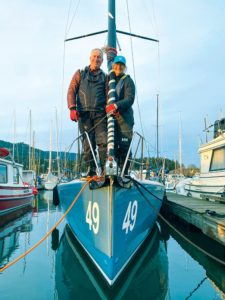
To be sure, shorthanded racing can be a fun challenge, and it is accessible to anyone with a sailboat. If you don’t have your own boat, you can socialize with your local yacht club to connect with others that are looking for crew. The opportunities to give shorthanded racing a try are more numerous than ever, and seem to be on the rise.
Our two pieces of advice for new shorthanded racers? First, sail more conservatively than you’re used to on fully crewed boats and gradually turn the dial up. Second, seek out mentors with shorthanded racing experience, and learn from their mistakes as well as their successes.
Looking ahead, we plan to sail Dash in as many doublehanded events as possible in the Pacific Northwest and beyond. We had hoped to sail the Van Isle 360 this year (it is now canceled) and are looking forward to the PNW Offshore in June, since they, too, have added a doublehanded division. It’s a big dream, but in 2022, we hope to set off in what may be the largest Pacific Cup fleet ever from San Francisco to Hawaii — 65-plus boats have already registered.
Photo by Ron Rosenberg.
The PNW Shorthanded Sailing Society
Finding shorthanded events in our region has been a challenge. Locals know about their own events and of course there’s the well-known Race to the Straits, but what opportunities are available to crews that want to play outside their local pond?
Together with Christina and Justin, who sail the J/111 Raku, we launched the PNW Shorthanded Sailing Society late last year. Our goal is to publish a calendar of shorthanded (1-2 crew) events throughout Washington and British Columbia and to help promote the growth of shorthanded racing in our region.
So far, we’ve found and published more than 30 events to the 2021 calendar. 120 people have signed up for the monthly mailing list and more than 170 people follow our Facebook page. We are pulling scoring from each doublehanded event/division and by the end of this year will know every boat that has participated in at least one shorthanded event.
Visit www.pnwsss.org to explore the calendar and join our mailing list.


